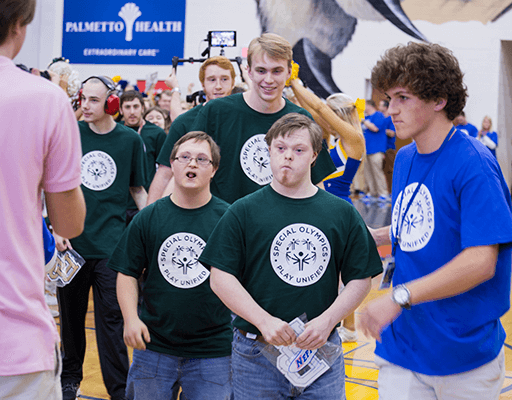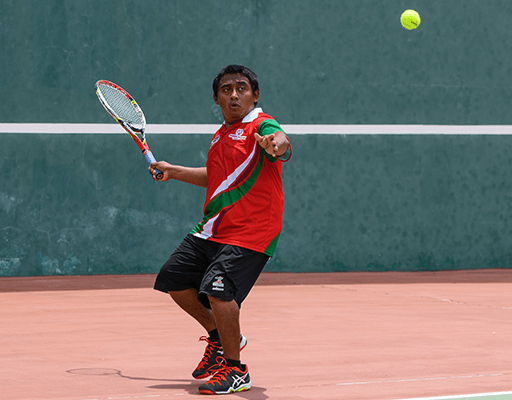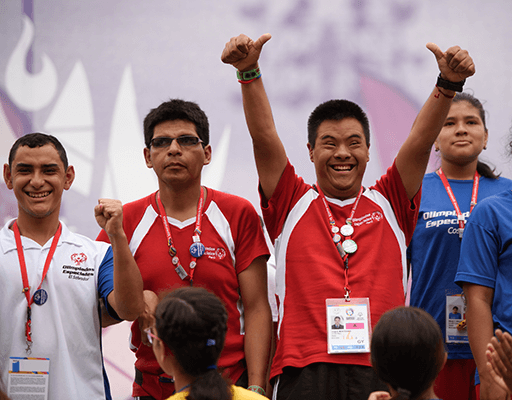Special Olympics Mission and History
Course Modules
Start Course
| Module 1 | Module 1 |
| Unit 1 | Introduction |
| Unit 2 | Special Olympics Mission and History |
| Unit 3 | Criteria for a successful unified sports program |
| Unit 4 | Course review |
| Unit 5 | Course test |
| Unit 6 | Sport: Unified Sports Coaching Course Evaluation Survey |
Powered By WP Courseware
Module Summary
Social inclusion
As Special Olympics and Unified Sports evolved, social inclusion became a goal. We learned that by taking part in a sport-based social inclusion program, athletes with intellectual disabilities can achieve a lot.
Through participation in Unified Sports, people with intellectual disabilities will:
-
build friendships and new social networks
-
become better athletes
-
connect with their community
-
increase their self-confidence and social skills
-
build trust
-
experience a decrease in problem behaviors
In many parts of the world, people with intellectual disabilities are coming out of isolation. They are taking their place in the communities that used to fear and separate them. Communities have begun to see that everyone benefits by recognizing the contributions from all its members. People with and without intellectual disabilities now interact more and more. Unified Sports has helped them discover that they are more alike than different.
Benefits of Unified Sports
In this section we will cover:
-
the benefits of Unified Sports
-
the three models of Unified Sports
In recent years, Universities from all over the world have done research on Unified Sports. They have shown that ALL teammates benefit from Unified Sports. This is seen in:
-
better sports skills and increased physical health
-
improved self-confidence
-
more chances to socialize
Three models of Unified Sports
Opportunities to participate in Unified Sports
There are a number of opportunities to participate in Unified Sports through schools and community programs. School systems around the world can look very different, especially in terms of education of students with intellectual disabilities. Special Olympics has developed ways to adapt the three Unified Sports models to fit different structures. All formats use sport to promote inclusion.
Click or tap on the headings below to find out more.
Integrated Schools have students with and without intellectual
disability in the same school and may or may not be in the same
academic classes. The schools may do Unified Sports activities during
or after the school day.
Some places have segregated school systems where students with and
without intellectual disability go to separate schools. In these
settings, Unified Schools involves partnerships that bring students
from mainstream schools and special education schools together for
Unified Sports activities.
There are areas where many individuals with intellectual disability
are not in school because they have aged out or do not live near
school-based opportunities. Special Olympics Programs can partner with
community sport programs, local sport clubs or other service
organizations to offer people with intellectual disabilities Unified
Sports activities.
Conducting Unified Sports activities in schools
Unified Sports can happen several ways within a school or community club or association. Schools have different options of how to organize Unified Sports activities.
Unified Sports recreation activities are 1-day events. Athletes and
partners come together for informal Unified Sports. If schools hold
these type of events, they must have at least 2 per year to be known
as a Unified School. This is a good starting point for schools new to
Unified Sports. However, we encourage schools to work towards more
ongoing activities. Examples of Unified Sports recreation activities
are kickball, field days, etc.
Unified Fitness Clubs bring students with and without intellectual
disability together for regular fitness activity. Athletes and
partners set fitness goals and monitor their progress regularly.
Unified Physical Education (PE) classes have students with and without
intellectual disability practice sports and do fitness activities
during the school day. Unified PE can be adapted to meet local or
national PE standards.
Intramural Leagues are where students in the same school (or pair of
schools) form Unified Sports teams and compete against each other.
Interscholastic Unified Sports competitions are when Unified School
teams within a similar geographic area compete against each other and
represent their school. These are scheduled by the schools or, if
needed, the local Special Olympics Program can assist with setting up
competitions. Additionally, some cities or towns have a school sports
association. They can be a good partner to help organize your
competitions.
Special Olympics also works with schools to engage students outside of
sport. We do that through:
-
Inclusive youth leadership
-
Whole school engagement
-
Advocacy
For more information, click or tap here to see our schools and youth resources
Regardless of structure, high-quality school-based Unified Sports programs make the most impact when they have:
-
frequent training, competition, and social activity opportunities
-
a certified adult coach
And lastly, Unified Sports is recognized by the school in a similar style as other sports activities in the school.
Conducting Unified Sports activities in the community
Unified Sports can be organized in a few ways within the community environment.
Click or tap on the headings below to find out what these include.
Local Special Olympics Programs can offer a Unified Sports league or
division within their current programming and structure. This is a
good option for programs that would like to engage their current
athletes in more offerings to develop sport-specific skills.
Create opportunities for Special Olympics athletes to join existing
local Sport Clubs or sport federations to participate in already
operating sport and competition structures.
Sports training and competitions within a previously structured
Community Sport League or Program. Special Olympics local programs can
collaborate with an existing sport organization or federation to offer
a Unified Sports league or division within the already existing
structure.


